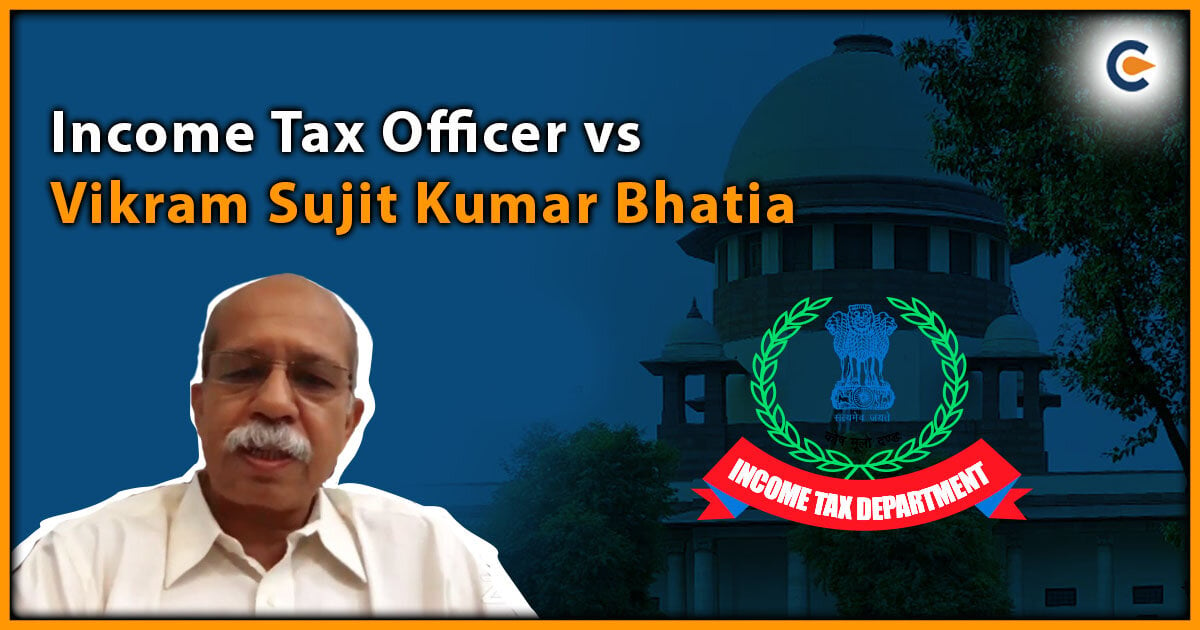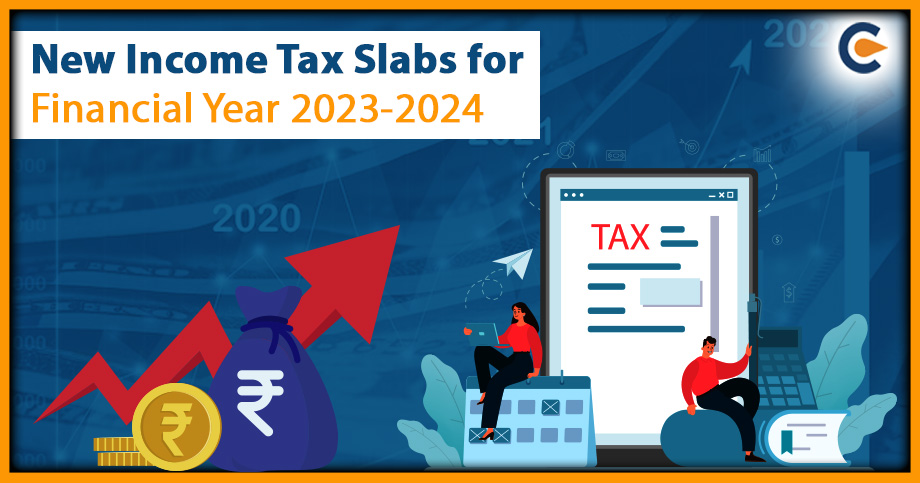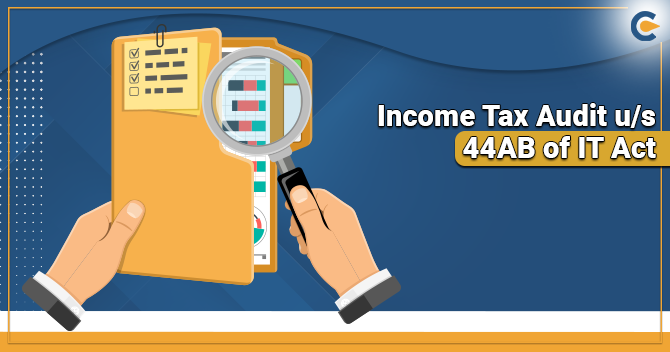The case of Income Tax Officer vs Vikram Sujit Kumar Bhatia is a landmark decision by the Supreme Court of India that has important implications for the protection of privacy rights. The case arose from a search and seizure operation conducted by the Income Tax Department at the premises of Vikram Sujit Kumar Bhatia. During the search, the Income Tax Department seized documents belonging to a third party, Sujit Kumar Bhatia. The Income Tax Department then issued a notice to Sujit Kumar Bhatia, requiring him to produce the seized documents. Sujit Kumar Bhatia objected to the production of the documents, arguing that he was not the person who was searched and that the documents did not belong to him.
The Income Tax department argued that the documents belonged to Sujit Kumar Bhatia because they related to his business dealings with Vikram Sujit Kumar Bhatia. The Income Tax Department also argued that the documents were relevant to the assessment of Vikram Sujit Kumar Bhatia’s income tax liability.
The Supreme Court held that the Income Tax Department could not compel Sujit Kumar Bhatia to produce the seized documents. The Court held that the words “belongs or belong to” in Section 153C of the Income Tax Act, 1961 should not be confused with the words “relates to or refers to.” The Court also held that the provision could not have been invoked unless the documents / material “belong to” the third party (other than the searched person).
The Supreme Court’s decision in Income Tax Officer vs Vikram Sujit Kumar Bhatia is a significant victory for the protection of privacy rights. The decision clarifies that the Income Tax Department cannot compel a third party to produce documents that belong to the searched person. This decision will help to protect the privacy of individuals who are not directly involved in a tax investigation.
Facts Of the Above-Mentioned Case
Sure, here are the facts of the case of Income Tax Officer vs Vikram Sujit Kumar Bhatia:
- On September 4, 2013, the Income Tax Department conducted a search and seizure operation at the premises of Vikram Sujit Kumar Bhatia.
- During the search, the Income Tax Department seized documents belonging to a third party, Sujit Kumar Bhatia.
- The Income Tax Department then issued a notice to Sujit Kumar Bhatia, requiring him to produce the seized documents.
- Sujit Kumar Bhatia objected to the production of the documents, arguing that he was not the person who was searched and that the documents did not belong to him.
- The Income Tax Department argued that the documents belonged to Sujit Kumar Bhatia because they related to his business dealings with Vikram Sujit Kumar Bhatia.
- The Income Tax Department also argued that the documents were relevant to the assessment of Vikram Sujit Kumar Bhatia’s income tax liability.
- Sujit Kumar Bhatia filed a writ petition in the Delhi High Court challenging the notice issued by the Income Tax Department.
- The Delhi High Court dismissed the writ petition.
- Sujit Kumar Bhatia then filed an appeal in the Supreme Court of India.
- The Supreme Court allowed the appeal and held that the Income Tax Department could not compel Sujit Kumar Bhatia to produce the seized documents.
- The Supreme Court’s decision in Income Tax Officer vs Vikram Sujit Kumar Bhatia is a significant victory for the protection of privacy rights. The decision clarifies that the Income Tax Department cannot compel a third party to produce documents that belong to the searched person. This decision will help to protect the privacy of individuals who are not directly involved in a tax investigation.
Arguments Presented by Both of The Parties of The Above-Mentioned Case
Sure, here are the arguments of the parties in the case of Income Tax Officer vs Vikram Sujit Kumar Bhatia:
Arguments Of Sujit Kumar Bhatia
Sujit Kumar Bhatia argued that he was not the person who was searched and that the documents did not belong to him. He also argued that the Income Tax Department could not compel him to produce the documents because they were protected by the right to privacy.
Arguments Of the Income Tax Department
The Income Tax Department argued that the documents belonged to Sujit Kumar Bhatia because they related to his business dealings with Vikram Sujit Kumar Bhatia. The Income Tax Department also argued that the documents were relevant to the assessment of Vikram Sujit Kumar Bhatia’s income tax liability.
The Income Tax Department also argued that the right to privacy was not absolute and that it could be overridden in certain cases, such as when the government is investigating a tax evasion case.
Decision Of the Supreme Court
The Supreme Court held that the Income Tax Department could not compel Sujit Kumar Bhatia to produce the seized documents. The Court held that the words “belongs or belong to” in Section 153C of the Income Tax Act, 1961 should not be confused with the words “relates to or refers to.” The Court also held that the provision could not have been invoked unless the documents / material “belong to” the third party (other than the searched person).
The Supreme Court’s decision in Income Tax Officer vs Vikram Sujit Kumar Bhatia is a significant victory for the protection of privacy rights. The decision clarifies that the Income Tax Department cannot compel a third party to produce documents that belong to the searched person. This decision will help to protect the privacy of individuals who are not directly involved in a tax investigation.
The Decision of The Court
The Supreme Court of India held that the Income Tax Department could not compel Sujit Kumar Bhatia to produce the seized documents. The Court held that the words “belongs or belong to” in Section 153C of the Income Tax Act, 1961 should not be confused with the words “relates to or refers to.” The Court also held that the provision could not have been invoked unless the documents / material “belong to” the third party (other than the searched person).
The Court’s decision was based on the following reasoning:
- The word “belongs or belong to” in Section 153C of the Income Tax Act, 1961 have a narrower meaning than the words “relates to or refers to.”
- The Income Tax Department cannot compel a third party to produce documents that belong to the searched person.
- The right to privacy is a fundamental right that is protected by the Constitution of India.
- The production of the seized documents would have violated Sujit Kumar Bhatia’s right to privacy.
The Supreme Court’s decision in Income Tax Officer vs Vikram Sujit Kumar Bhatia is a significant victory for the protection of privacy rights. The decision clarifies that the Income Tax Department cannot compel a third party to produce documents that belong to the searched person. This decision will help to protect the privacy of individuals who are not directly involved in a tax investigation.
Significance Of the Decision of Case
The Supreme Court’s decision in Income Tax Officer vs Vikram Sujit Kumar Bhatia is a significant victory for the protection of privacy rights. The decision clarifies that the Income Tax Department cannot compel a third party to produce documents that belong to the searched person. This decision will help to protect the privacy of individuals who are not directly involved in a tax investigation.
The decision is significant for several reasons. First, it clarifies the scope of the Income Tax Department’s powers under Section 153C of the Income Tax Act, 1961. Second, it reaffirms the importance of the right to privacy as a fundamental right. Third, it sets a precedent that can be used to protect the privacy of individuals in other contexts, such as when the government is investigating other types of offenses.
The decision is a welcome development for the protection of privacy rights in India. It is a reminder that the government cannot violate the privacy of individuals simply because they are related to someone who is under investigation. The decision will help to ensure that an individual’s privacy is protected, even when the government is trying to enforce the law.
Conclusion
In conclusion, the Supreme Court’s decision in Income Tax Officer vs Vikram Sujit Kumar Bhatia is a significant victory for the protection of privacy rights. The decision clarifies that the Income Tax Department cannot compel a third party to produce documents that belong to the searched person. This decision will help to protect the privacy of individuals who are not directly involved in a tax investigation.
The decision is a welcome development for the protection of privacy rights in India. It is a reminder that the government cannot violate the privacy of individuals simply because they are related to someone who is under investigation. The decision will help to ensure that individuals’ privacy is protected, even when the government is trying to enforce the law.
The decision is also significant because it sets a precedent that can be used to protect the privacy of individuals in other contexts, such as when the government is investigating other types of offenses. The decision is a reminder that the government must respect the right to privacy, even when it is trying to enforce the law.
Read our Article:Deputy Commissioner Of Income Tax Vs M/S Pepsi Food Limited










